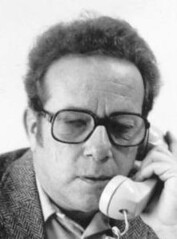UFO Briefing Document, Don Berliner
Summary: In the mid-1970s, the Prime Minister of the new member state of Grenada, Sir Eric Gairy, began a lobbying initiative to incorporate the UFO problem in the United Nations agenda. Prime Minister Gairy and UN Ambassador Wellington Friday raised the UFO issue at a meeting of the thirty-second General Assembly Special Political Committee on November 28, 1977.
In the mid-1970s, the Prime Minister of the new member state of Grenada, Sir Eric Gairy, began a lobbying initiative to incorporate the UFO problem in the United Nations agenda. Prime Minister Gairy and UN Ambassador Wellington Friday raised the UFO issue at a meeting of the thirty-second General Assembly Special Political Committee on November 28, 1977. Grenada was proposing the "establishment of an agency or a department of the United Nations for undertaking, coordinating and disseminating the results of research into Unidentified Flying Objects (UFOs) and related phenomena." 154
Grenada made further statements on November 30 and December 6, 1977. As a result of this effort, at the 101st plenary meeting on December 13, 1977, "the General Assembly adopted Decision 32/424," which acknowledged "the draft resolution submitted by Grenada" and further stated that:
"3. The General Assembly requests the Secretary-General to transmit the text of the draft resolution, together with the above-mentioned statements, to Member States and to interested specialized agencies, so that they may communicate their views to the Secretary-General."155
Secretary-General Kurt Waldheim duly forwarded "Decision 32/424" to the Member States by a "note verbale" on March 13, 1978. However, only three governments responded (India, Luxembourg and Seychelles) and only two specialized agencies (International Civil Aviation Organization and UNESCO) replied with a flat "no comments to offer."156 Not deterred, Grenada launched a new offensive during the thirty-third General Assembly.
A group of recognized experts was brought to testify before a Hearing of the Special Political Committee on November 27, 1978. Besides Sir Eric Gairy and Wellington Friday, the Hearing included testimony by Drs. Allen Hynek and Jacques Vallee, and a first-hand witness account by Lt. Col. Lawrence Coyne of the U.S. Army (Reserve) on the famous 1973 UFO-helicopter near collision case in Ohio (see Quotations, section on Military/Intelligence). A letter of endorsement by astronaut Gordon Cooper, who was then Vice-President of Research & Development of Walt Disney Enterprises, was also read into the record (see Quotations, section on Astronauts).
At the 87th plenary meeting of the General Assembly on December 19, 1978, Decision 33/426 was adopted with the same heading to the previous Decision 32-424 cited above, "Establishment of an agency or a department of the United Nations for undertaking, coordinating and disseminating the results of research into unidentified flying objects and related phenomena." The "consensus text" informed in its Point 1 that the General Assembly had "taken note" of the "draft resolutions submitted by Grenada" and that:
"2. The General Assembly invites interested Member States to take appropriate steps to coordinate on a national level scientific research and investigation into extraterrestrial life, including unidentified flying objects, and to inform the Secretary-General of the observations, research and evaluation of such activities.
"3. The General Assembly requests the Secretary-General to transmit the statements of the delegation of Grenada and the relevant documentation to the Committee on the Peaceful Uses of Outer Space, so that it may consider them at its session in 1979."157
Point 4 finally stated that the Outer Space Committee would permit Grenada "to present its views" in 1979 and the Committee's deliberation would be included in its report to the thirty-fourth General Assembly. The Grenada initiative was gradually opening the door to UFO cooperative international investigation, but unfortunately the effort came to an abrupt halt when the Gairy government was overthrown by a Marxist revolution led by Maurice Bishop. The new government launched a publicity campaign to discredit Gairy as a believer in voodoo and flying saucers. Decision 33/426 was never implemented, but its mere existence provides a useful framework for any future initiative on the matter.
Don Berliner,
skip to main |
skip to sidebar

Knowledge & Technology
H&SR/CCIS/SDI

- Ian T. Cruz
- Barcelona, Catalunya, Spain
- Human and Science Research es un proyecto multidisciplinar de investigación y divulgación científica, sin ánimo de lucro, constituido por una pequeña asamblea cooperativa de individuos de diversas ciencias, movidos por la decepción política, la filantropía y el medioambientalismo. Trabajando por la libertad de información y la libertad de expresión. Promoviendo una cultura de paz, de cooperación, de búsqueda del conocimiento; un movimiento por el cambio y la exigencia política. El análisis del nuevo paradigma y el estudio de las implicaciones sociológicas, geopolíticas y economico-energéticas. Quienes somos: "CCIS - Campaign for Cooperation in Space" (por sus siglas en inglés) o Campaña para la Cooperación en el Espacio es una Red Internacional Coordinada para involucrar a los Gobiernos Miembros de las Naciones Unidas, Organizaciones No-Gubernamentales, Medios de Comunicación y a la gente para implementar una Prohibición Permanente de las Armas en el Espacio.
Navbar
Archivo del blog
-
►
2006
(28)
- ► septiembre (1)
-
▼
2005
(129)
- ► septiembre (6)
-
▼
junio
(11)
- EU and Russia: A roadmap for the Common Economic S...
- Group Calls for Disclosure of UFO Info
- What people are saying about Exopolitics
- Odd Spot on Titan Baffles Scientists
- European Commission tables first elements for a Eu...
- Recommendation to Establish UN Agency for UFO Rese...
- UFOs, THE U.N. AND GA 33/426
- UFO Briefing Document: International Agreements an...
- Astronaut Gordon Cooper's Message to the UN
- The 100 Most Influential People in Ufology Today
- The Fiftieth Anniversary of First Contact?
Our Del.icio.us Tags & Links:
Campaign for Cooperation in Space
STAR DREAMS INITIATIVE (SDI)
PEACE ON EARTH RADIO: with Alfred Lambremont Webre
CFR.org - The Council on Foreign Relations
Common Dreams | News & Views
SPACE.com
Conspiracy Research:
Signs of the Times:
Odeo: OdeoPolitics's inbox:
No More Hoaxes - Forum
TheTruthSeeker.org
irrepressible.info:
William T. Hathaway Blog:
infowarsnews at Yahoo! Groups
Spaceports Blog:
NASA Watch:
Wired News: Politics
SpaceRef: Top Stories
U.S. Dept. of Defense: Speeches
Reuters: World
Nature: Current Issue
Space Politics:
The Space Review
Note to Authors:
Human & Science Fair Research Org. 08036 - Barcelona, Spain.
NOTE TO AUTHORS: If you are the author of any article and do not wish to have your article published at the Research Journal website, please write to us, and we will remove the article.
staff@human-science.org
New Scientist: Latest Headlines
Moon Phase:
USGS M5+ Earthquakes
TheFreeDictionary.com
Article of the Day
Website content
provided by The Free Dictionary
This day in history
Website content
provided by The Free Dictionary
RedOrbit News - General
ESA: Science & Technology
Union of Concerned Scientists (UCS)
NYT: International
The Breakthrough Institute:
Genetic Future Weblog
Indiadaily.com - Technology
Moreover Technologies - Science: physical sciences news
Mars Today Top Stories
Resources (temporarily in disarray)
- New Energy Movement
- The Int. Institute for Strategic Studies
- UNESCO - Social & Human Sciences
- Environmental Change Institute
- Human Rights Watch
- Transnational Institute
- Institut for Sustainable Development
- Oxford Future of Humanity Institute
- International Space University
- Center for Bioethics and Culture Network
- Foundation for Defense of Democracies
- Oxford Uehiro Centre for Practical Ethics
- Higher Learning Commission
- Want to Know
- Maharishi University of Management
- CyberJournal.org
- Exopolitics.com
- Dr. Michael E. Salla
- Dr. James Deardorff
- Vancouver Coop Radio
- Coast to Coast AM
- Tesla Society
- Signs Of The Times (+podcast!)
- European Council
- CSETI Institute
- UFO Evidence
- Space Energy Access Systems
- The Disclosure Project
- Disclosure Project Briefing Document
- Paradigm Research Group
- Declaration of Cosmic Cooperation
- Exopolitics Toronto
- Ed Komarek Exopolitics Research
- Blue Book Project
- Majestic Documents
- The Enterprise Mission
- Cydonian Imperative
- Mainly Martian
- The Phoenix Lights
- New Frontiers in Science
- Robert Zimmerman Bibliography
- Graham Hancock Research
- Alex Jones Activism
- French UFO Research Institute
- SciForums.com
- SETI Institute
- The Brookings Institution
- World General Scientific Society
- European Council
- World Watch Institute
- Jaimes Martin Institute
- European Parliament
- European Court of Human Rights
- Crossref.org
- Center on Migration Policy and Society
- Nick Bostrom's Research
- Oxford University
- Mahatma Gandhi Research & Media Service
- New Horizons for Learning
- Woman's Int. League for Peace and Freedom
- Inter-Parliamentary Union
- Singularity Institute
- The Encyclopedea of Philosophy
- Mother Earth
- The Albert Einstein Institution
- Earth Day Network
- Institute for Genomic Research
- Darwin Foundation
- Oceana Europa
- UN - World Urban Forum
- Noam Chomski
- Foreign Policy Mag (Spanish)
- Nature.com
- India Daily
- Science Magazine
- Astrobiology Magazine
- Current Solar Activity
- SpaceWeather.com
- CBC Archives
- Nexus Magazine
- NOVA Online
- BBC News
- AstroBiology.com
- Space Flight Now
- European Space Agency
- ESA - Technical & Quality Management
- ESA - Cassini/Huygens
- Max-Planck Institut
- Gamma-ray Burst Real-time Sky Map
- Orbit Investigations
- SharingEarthObservationResources
- NOAA - Enviormental Satellite, Data & Info
- HubbleSite.org, NewsCenter
- Instituto de Astrofísica de Canarias
- CHANDRA X-Ray Observatory
- Malin Space Science Systems
- Highest-Resolution View of "Face on Mars"
- Archaeological Computing Lab
- Planetary PhotoJournal
- Cassini Imaging Lab
- Mars Express
- MGS - Thermal Emission Spectrometre
- MGS - Image Dump
- Mars Pathfinder
- NASA Astrobiology Institute
- Smithsonian Astrophysical Observatory
- Clementine Lunar Image Browser
- European Southern Observatory
- Astrometric Mapping Explorer
- Earth Simulator Project
- Global Internet Geography
- Cyber-Geography Research
- The Exploration of the Earth's Magnetosphere
- Electrogravitational Mechanics
- STS-75, Tether Experiment Mission
- NASA Space Shuttle Launch Archive
- Tethers Unlimited Inc.
- HAARP Homepage
- Extrasolar Planet Encyclopaedia
- JPL - Solar System Dynamics
- Agrupació Astronómica de Barcelona
- Hubble Source
- Astronaut Photography Library
- Planet Search Project
- Moon Landing Hoax
- First Lunar Landing
Flickr:
We support the right to free speech & sharing of information on the Internet
"In the councils of Government, we must guard against the acquisition of unwarranted influence, whether sought or unsought, by the Military Industrial Complex. The potential for the disastrous rise of misplaced power exists, and will persist. We must never let the weight of this combination endanger our liberties or democratic processes. We should take nothing for granted. Only an alert and knowledgeable citizenry can compel the proper meshing of the huge industrial and military machinery of defense with our peaceful methods and goals so that security and liberty may prosper together."
- President Eisenhower, January 1961
